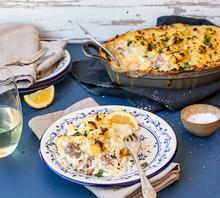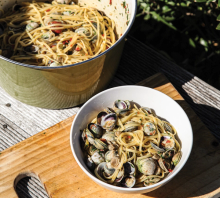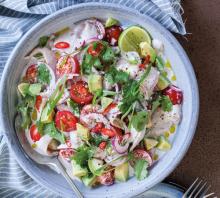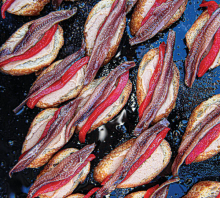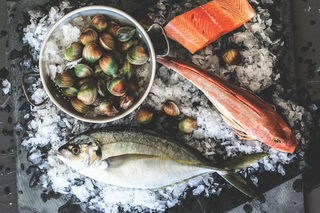
COOKING
|
SUSTAINABILITY
Sustainable Seafood
By Rose Langbein
Save Article
A Precious Taonga
We have such an incredible diversity of options available to us in Aotearoa.
Fishing plays an integral role in kiwi culture. In the summertime, many of us will put out a cray pot, leave a longline out at the beach, go free driving for paua or catch a few eels at the local lake or stream. We have such fond memories of summer days at the beach searching for cockles at low tide and cooking up a big vongole with lots of garlic, lemon and parsley for all to share. These traditions are ones that we hope we will continue for many years to come, so that future generations may enjoy the bounties of nature and our kai moana.
Unfortunately, overfishing and malpractice have resulted in many of our stocks being depleted and species endangered to the point of extinction. The magnificent blue fin tuna is down to global stock levels of just 2% and will most likely soon be extinct. This is hard to comprehend and we need to ban its sale to try and save it. When buying seafood, make sure you ask where it comes from and how it was caught. The biggest red flag to watch out for is anything bottom trawl-caught. Bottom-trawl fishing severely damages seafloor ecosystems. Seabirds, marine mammals, and turtles end up as bycatch in many industrial fishing operations, as well as a number of smaller fish that get picked up in these nets and then thrown away. The weight of the nets also leaves a path of destruction on the seafloor.
Our oceans are a gift from nature, and are to be enjoyed as such. We have a responsibility to protect what is there, and to show some leadership for the rest of the world. We can demonstrate what a sustainable fishing industry looks like and lead the path to a better future.
Times have changed, no longer can you bring home 6 kingfish after a long day out in the harbour, or 20 paua diving off the rocks. There are limits and restrictions to what you can take.
Just because something is for sale at your local fish shop or supermarket doesn’t mean it’s always a sustainable choice. Snapper, whilst a popular choice well-loved by kiwis, is not a sustainable choice. Forest & Bird has published a highly comprehensive Best Fish Guide, outlining which species are great to eat, and which you should avoid. They list includes 9 ‘great to eat choices’ and a further 33 ‘ok to eat’ choices. They recommend farmed mussels, pacific oysters, paua and salmon, and cockles, albacore tuna, slipjack tuna and pilchard as ‘best choice’ species. Kahawai, blue cod, trevally, blue mackerel, and kingfish are all ‘ok to eat’. Swordfish, snapper, orange roughy, and groper are all ‘worst choice’ species.
So instead of snapper, reach for some blue cod, trevally, blue moki, kingfish, and fresh line-caught kahawai the next time you are buying fish. These limitations are important to respect and uphold, otherwise there simply won’t be any fish left. Instead of feeling like you're missing out, see this is an opportunity to discover new species and get creative in the kitchen.
We, as consumers, can directly affect the fishing industry. By refusing seafood that has not been sustainably fished we take the pressure off those at-risk and endangered species so that we and future generations can enjoy fresh New Zealand seafood for many years to come.
Here are some tips and tricks to help you save money and our oceans whilst enjoying the beautiful kai moana our country has to offer:
Kingfish and trevally are beautiful fish for crudo & ceviche — ensure they are line caught and very fresh. We will often use them for tacos too. This Beachside Ceviche is a great way to enjoy super fresh kingfish and trevally.
Line-caught blue cod is also delicious in tacos or pan-fried.
Kahawai and ling are great in curries, pies, and baked fish dishes like this Lemony Fish Pie — a family classic.
Anchovies and sardines are an excellent source of omega-3 and are packed with flavour so you don't need to use much. This Anchovy Crostini is wonderfully moreish.
When buying squid, check that it is jig-caught (trawl-caught squid is not a sustainable choice). This Grilled Squid & Fennel Salad is a great summer dish for the barbecue.
If you can, use wild Australian king prawns, they are much more sustainable than those from the rest of the world (and they haven’t had to travel as far), or seek out organically farmed prawns. Try these Prawn Salad Rolls.
Cockles and mussles are also fantastic — we love them in a classic Vongole or Paella.
